|
NOTE 9-INCOME TAXES
The provision for income taxes is comprised of the following:
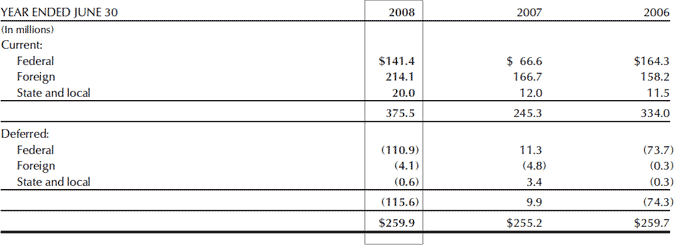
A reconciliation between the provision for income taxes computed by applying the statutory Federal income tax rate to earnings before income taxes and minority interest and the actual provision for income taxes is as follows:
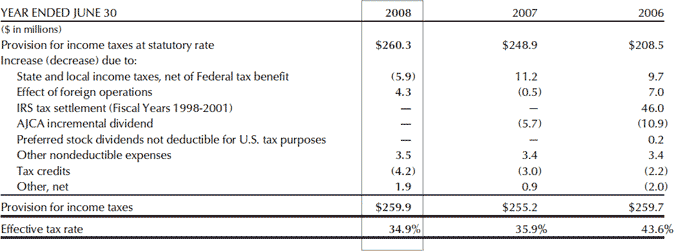
The state and local tax benefit of $5.9 million in fiscal 2008 includes the favorable resolution of several state and local income tax examinations as well as statute lapses.
On July 13, 2006, the Company announced a settlement with the Internal Revenue Service ("IRS") regarding its examination of the Company's consolidated Federal income tax returns for the fiscal years ended June 30, 1998 through June 30, 2001. The settlement resolved previously disclosed issues raised during the IRS's examination, including transfer pricing and foreign tax credit computations. The settlement of these issues resulted in a tax charge of approximately $46 million in the fourth quarter of fiscal 2006 and represents the aggregate earnings impact of the settlement through fiscal 2006. In addition, during the fourth quarter of fiscal 2006, the Company completed the repatriation of foreign earnings through intercompany dividends as required under the provisions of the American Jobs Creation Act of 2004 (the "AJCA"). In connection with the repatriation, the Company updated the computation of the related aggregate tax impact, resulting in a favorable adjustment of approximately $11 million. The tax settlement, coupled with the AJCA favorable tax adjustment, resulted in a net increase to the Company's fiscal 2006 income tax provision of approximately $35 million.
Federal income and foreign withholding taxes have not been provided on approximately $813 million of undistributed earnings of international subsidiaries at June 30, 2008. The Company intends to reinvest these earnings in its foreign operations indefinitely, except where it is able to repatriate these earnings to the United States without material incremental tax provision. As of June 30, 2007 and 2006, the Company had not provided federal income and foreign withholding taxes on approximately $539 million and $336 million, respectively, of undistributed earnings of international subsidiaries. The determination and estimation of the future income tax consequences in all relevant taxing jurisdictions involves the application of highly complex tax laws in the countries involved, particularly in the United States, and is based on the tax profile of the Company in the year of earnings repatriation. Accordingly, it is not practicable to determine the amount of tax associated with such undistributed earnings.
Significant components of the Company's deferred income tax assets and liabilities as of June 30, 2008 and 2007 were as follows:
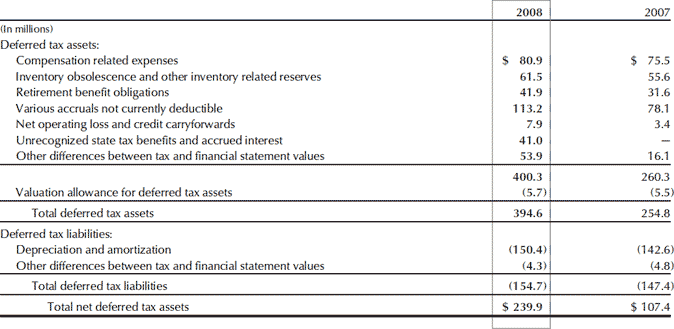
As of June 30, 2008 and 2007, the Company had current net deferred tax assets of $184.6 million and $124.0 million, respectively, which are included in Prepaid expenses and other current assets in the accompanying consolidated balance sheets. In addition, the Company had noncurrent net deferred tax assets of $55.3 million as of June 30, 2008 which are included in Other assets, net in the accompanying consolidated balance sheet and noncurrent net deferred tax liabilities of $16.6 million
as of June 30, 2007 which are included in Other noncurrent liabilities in the accompanying consolidated balance sheet.
As of June 30, 2008 and 2007, certain international subsidiaries had tax loss carryforwards for local tax purposes of approximately $27 million and $11 million, respectively. With the exception of $21.6 million of losses with an indefinite carryforward period as of June 30, 2008, these losses expire at various dates through fiscal 2023. Deferred tax assets, net of valuation allowances, in the amount of $4.5 million and $1.2 million as of June 30, 2008 and 2007, respectively, have been recorded to reflect the tax benefits of the losses not utilized to date.
A full valuation allowance has been provided for those deferred tax assets for which, in the opinion of management, it is more likely than not that the deferred tax assets will not be realized.
Earnings before income taxes and minority interest include amounts contributed by the Company's international operations of approximately $905 million, $696 million and $603 million for fiscal 2008, 2007 and 2006, respectively. A portion of these earnings are taxed in the United States.
The Company adopted the provisions of FIN 48, as amended, effective July 1, 2007. As a result, the Company recognized an increase in the liability for unrecognized tax benefits and interest of $13.1 million (after tax), which, as required, was recorded as an adjustment to opening retained earnings as of July 1, 2007. The Company elected to continue its historical practice of classifying applicable interest and penalties as a component of the provision for income taxes. At adoption, the Company had $142.7 million of gross unrecognized tax benefits. The Company's gross accrual for interest and penalties related to unrecognized tax benefits was $42.0 million upon adoption of FIN 48. As of June 30, 2008, the Company had gross unrecognized tax benefits of $199.0 million. The total amount of unrecognized tax benefits that, if recognized, would affect the effective tax rate was $119.4 million. The total gross accrued interest and penalties during the fiscal year ended June 30, 2008 in the accompanying consolidated statement of earnings was $12.0 million and the total gross accrued interest and penalties in the accompanying consolidated balance sheet at June 30, 2008 was $54.0 million. As of June 30, 2008, current and noncurrent liabilities have been increased by $90.8 million, with a correlative increase in current and noncurrent assets to reflect the Company's gross income tax and interest liabilities for unrecognized tax benefits as well as related deferred tax assets. A reconciliation of the beginning and ending amount of gross unrecognized tax benefits is
as follows:
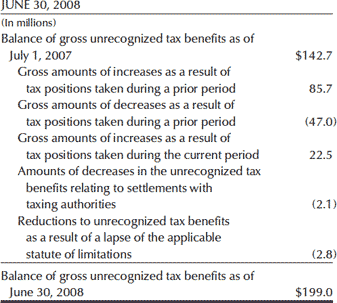
Included in the balance at June 30, 2008 are $31.6 million of tax positions for which the ultimate deductibility is highly certain but for which there is uncertainty about the timing of such deductibility. Because of the impact of deferred tax accounting, other than interest and penalties, the disallowance of the shorter deductibility period would not affect the annual effective tax rate but would accelerate the payment of cash to the taxing authority to an earlier period.
Earnings from the Company's global operations are subject to tax in various jurisdictions both within and outside the United States. The Company is routinely audited and examined in these jurisdictions. The Company provides tax reserves for U.S. federal, state, local and international unrecognized tax benefits for periods subject to audit. The development of reserves for these exposures requires judgments about tax issues, potential outcomes and timing, and is a subjective critical estimate. The Company assesses its tax positions and records tax benefits for all years subject to examination based upon management's evaluation of the facts, circumstances, and information available at the reporting dates. For those tax positions where it is more-likely-than-not that a tax benefit will be sustained, the Company has recorded the largest amount of tax benefit with a greater than 50% likelihood of being realized upon settlement with a tax authority that has full knowledge of all relevant information. For those tax positions where it is not more-likely-than-not that a tax benefit will be sustained, no tax benefit has been recognized in the financial statements. Where applicable, associated interest and penalties have also been recognized. Although the outcome related to these exposures is uncertain, in management's opinion, adequate provisions for income taxes have been made for estimable potential liabilities emanating from these exposures. In certain circumstances, the ultimate outcome of exposures and risks involve significant uncertainties which render them inestimable. If actual outcomes differ materially from these estimates, including those that cannot be quantified, they could have a material impact on the Company's results of operations.
The Company is currently subject to a U.S. federal tax audit as well as examinations and controversies in several state, local, and international jurisdictions. These matters are in various stages of completion and involve complex multi-jurisdictional issues common among multinational enterprises, including transfer pricing, that may require an extended period of time for resolution. During the fourth quarter of fiscal 2008, the IRS completed the examination phase of fiscal years 2002 through 2005. The Company has brought disputed adjustments concerning U.S. foreign tax credit determinations to the Appeals Division of the IRS for review as well as entered a claim pursuant to an administrative process of the tax treaty between the U.S. and Belgium (commonly referred to as the "Competent Authority" process). Notwithstanding the matters pending before the Appeals Division and Competent Authority, the Company has reached a tentative agreement with the IRS concerning the examination adjustments proposed. In the fourth quarter, the Company made a cash payment of $35.0 million to the U.S. Treasury as an advance deposit in anticipation of a formal resolution to the tentatively agreed-to adjustments. Although the advance deposit limits the accrual of additional interest that would be due to the U.S. Treasury, there is no impact on the amount of unrecognized tax benefits until a formal settlement is reached. Separately, the IRS has informally advised the Company that it intends to commence an examination of the fiscal years 2006 and 2007 during the second quarter of fiscal 2009.
The Company had been notified of a disallowance of tax deductions claimed by its subsidiary in Spain for the fiscal years 1999 through 2002. As a result, the subsidiary was reassessed corporate income tax of $3.3 million for this period, at current exchange rates. An appeal against this reassessment was filed with the Chief Tax Inspector. On July 18, 2005, the final assessment made by the Chief Tax Inspector was received, confirming the reassessment made by the tax auditors. During fiscal 2006, an appeal against this final assessment was filed with the Madrid Regional Economic Administrative Tribunal ("TEAR"). In view of the TEAR's silence, during fiscal 2007 the claim was presumed to be dismissed and an appeal was filed against it with the Central Economic-Administrative Tribunal ("TEAC"). During the fourth quarter of fiscal 2008, the TEAC dismissed the claim and, on June 10, 2008, the Company filed an appeal for judicial review with the National Appellate Court. While no assurance can be given as to the outcome in respect of this assessment and pending appeal in the Spanish courts, management believes it is more-likely-than-not that the subsidiary will be successful in its defense against the assessment and continues to measure the full amount of the tax benefit. Accordingly, no tax reserve has been established for this potential exposure.
During fiscal 2008, the Company concluded various state, local and foreign income tax audits and examinations while several other matters, including those noted above, remained pending. On the basis of the information available in this regard as of June 30, 2008, it is reasonably possible that a reduction in a range of $30 million to $60 million of unrecognized tax benefits may occur within 12 months as a result of projected resolutions of global tax examinations and controversies.
The tax years subject to examination vary depending on the tax jurisdiction. As of June 30, 2008, the following tax years remain subject to examination by the major tax jurisdictions indicated:
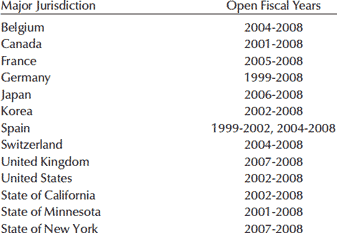
The Company is also subject to income tax examinations in numerous other state, local and foreign jurisdictions. The Company believes that its tax reserves are adequate for all years subject to examination.
|